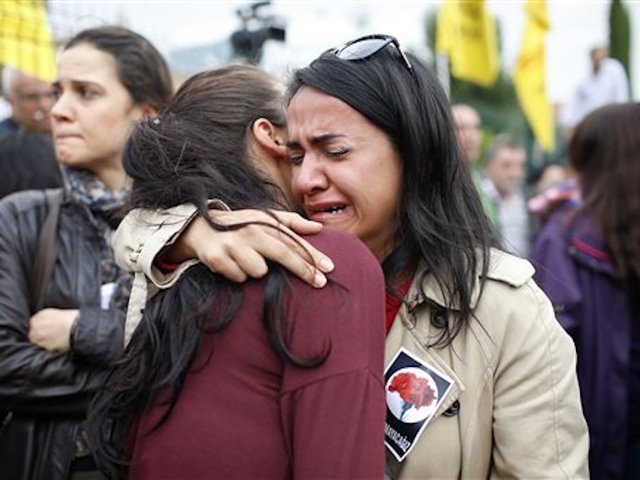-
Tips for becoming a good boxer - November 6, 2020
-
7 expert tips for making your hens night a memorable one - November 6, 2020
-
5 reasons to host your Christmas party on a cruise boat - November 6, 2020
-
What to do when you’re charged with a crime - November 6, 2020
-
Should you get one or multiple dogs? Here’s all you need to know - November 3, 2020
-
A Guide: How to Build Your Very Own Magic Mirror - February 14, 2019
-
Our Top Inspirational Baseball Stars - November 24, 2018
-
Five Tech Tools That Will Help You Turn Your Blog into a Business - November 24, 2018
-
How to Indulge on Vacation without Expanding Your Waist - November 9, 2018
-
5 Strategies for Businesses to Appeal to Today’s Increasingly Mobile-Crazed Customers - November 9, 2018
Turkish Prime Minister Says Islamic State Behind Weekend Blasts That Killed 97
“These attacks won’t turn Turkey into a Syria”, Prime Minister Ahmet Davutoglu said.
Advertisement
The Hurriyet daily reported that the authorities had taken DNA samples from families of 16 people suspected of being members of the IS group. There (has) been good progress toward identifying a name. “That name points to an organisation”, he said.
Deputy Prime Minister Numan Kurtulmus said Monday that the two bombers exploded about 5 kilograms (11 pounds) of dynamite each, and that authorities have detained “a large number” of suspects. ISIS does not control any part of Iraq’s border with Turkey, though it does have access to parts of Syria’s border with Turkey.
The weekend blasts targeted crowds at a lunchtime peace rally calling for an end to the renewed conflict between the Kurdistan Workers’ Party, or PKK, and the Turkish government. The Kurds are an ethnic group whose lands straddle Iran, Iraq, Syria and Turkey, where rebels fighting for autonomy in the mainly Kurdish southeast region since 1984 had been engaged in peace process with the Turkish government since 2012.
Indeed, the attack in the heart of the capital – far from the conflicts bleeding over Turkey’s southern borders – is rattling nerves around the nation and beyond. “This is an attack directed at our democracy and at our people as a whole”, Davutoglu told NTV.
Analysts say the bombings inside Turkey could only make the parliamentary election results less conclusive, meaning government stability will depend on the political parties’ ability to form coalitions and cooperate – an elusive capacity as the country becomes more and more polarized.
“There is also an attempt to cast shadow on the elections”.
AKP spokesman Omer Celik said that the party had cancelled all campaign rallies until Friday and thereafter would hold “anti-terror” unity rallies.
Turkey declared three days of mourning over the bombings. That was the message of thousands who took to the streets of Ankara on Sunday to protest.
The report also supported the re-listing of four other organisations: Al-Shabaab, Hamas Izz al-Din al Qassam Brigades, Lashkar-e-Tayyiba and Palestinian Islamic Jihad.
But police officers blocked the group, whose members included opposition lawmakers.
On Sunday, police fired tear gas and scuffled with the mourners – a few chanting “Murderer Erdogan!” – who tried to reach the blast site to lay carnations. Around 40 suspected ISIS militants have been arrested since the attack, but it is still unclear if there is any link to the bombings, and nobody has claimed responsibility. An ISIS supporter was blamed for carrying out that attack, but the group never claimed responsibility.
Hundreds of people marched through Istanbul and the Turkish capital of Ankara on Monday to condemn the slaughter by suicide bombers at a weekend peace rally, with many venting their anger at the Turkish government itself. Erdogan has asserted that Kurdish rebels are a bigger threat to Turkey than the Islamic State group. The bombers struck hours before Kurdish rebels battling Turkish security forces followed through with plans to declare a unilateral cease-fire, to reduce tensions leading up to November. 1 elections. A pro-Kurdish party has said that up to 128 people died.
“Their public statements show a readiness to blame the victims of this attack and our party”.
Advertisement
CNN’s Susannah Cullinane wrote from London, and CNN’s Arwa Damon reported from Ankara.





























